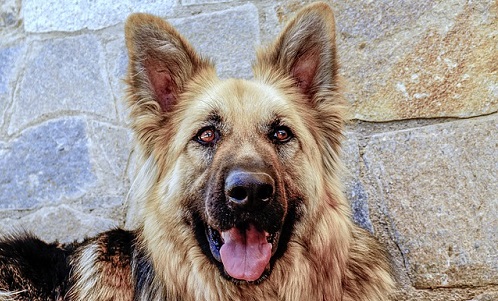As humans, often our dog’s behavior can be a bit of a mystery. Probably one of the most mysterious and baffling behaviors a dog can display is eating grass and then throwing up. Yuck. It’s actually not as common as you might think for a dog to eat grass and then vomit, although eating grass alone appears to be normal behavior.
So then you might be asking, “Why does my dog eat grass and then throw it up right after?” The interesting thing is that not all dogs even seem to be sick before eating grass. Which tends to blow the theory that they’re eating grass due to an upset stomach right out of the water.
Of course, there are people on both sides of the divide. Some say dogs eat grass because they have an upset stomach and the grass helps them to vomit up whatever bug is making them feel bad.
Others say dogs eat grass and vomit out of a natural instinct that hails from their wild dog days. According to them, the tendency could be related to some sort of nutritional deficiency, such as the dog not having enough fiber in their diet.
Wild dogs and wolves often ate grass and plants, and the behavior is thought to be an instinctual way of seeking more fiber, minerals, and other nutrients. The question of why dogs eat grass and then vomit it back up is something vets and experts have asked themselves for years, with no really definitive answers.
So, it’s not to say dogs aren’t eating grass because of an upset stomach. They could be. But ultimately, the jury is still out on why dogs eat grass then throw up.
Another quirk that baffles experts is many dogs eat grass, throw up, then go right back to eating more grass! Go figure. Sometimes they even eat their own vomit.
When you catch your dog behaving in this way, you might feel bad and wonder if you are feeding your dog enough. Maybe he is still hungry, or maybe there is something he needs in his diet that you’re missing and failing to give him. Maybe you’re doing this “dog parenting” thing all wrong.
Relax!
For the most part, experts seem to agree that in most cases, regardless of why they do it, dogs that occasionally eat grass then vomit it back up is relatively normal behavior.
 However, if it seems like your dog is eating grass and other materials in response to an upset stomach and it becomes a habit, it may not be as normal as you first thought. Some vets compare such behavior to the pica disorder people can suffer from.
However, if it seems like your dog is eating grass and other materials in response to an upset stomach and it becomes a habit, it may not be as normal as you first thought. Some vets compare such behavior to the pica disorder people can suffer from.
Pica is where people eat material that isn’t food, such as glue or paper. Experts believe it’s possible that dogs can suffer from pica disorder, too. If you suspect your dog might be suffering from pica disorder, you should see your vet to discuss your options.
Either way, the good news is that as long as your dog isn’t eating toxic chemicals along with his grass, he should be relatively safe.
But in case you were wondering, here are a few reasons your dog may like to graze on the greenery.
Dogs Eat Grass Because it is Tasty
The truth of the matter is that some dogs just like how that blade of grass tastes. Most dogs are little scavengers that get into everything that smells enticing. In fact, scavenging is a natural instinct for them. There may be something about that blade of grass they are eating that tastes great.
Dogs Eat Grass Because They Need More Fiber
Sometimes, dogs will eat grass and vomit because they are lacking nutrition, such minerals, digestive enzymes, or fiber. You could try adding foods to their diet that give them more fiber and nutrients and see if the change helps curb their behavior.
Dogs Eat Grass to Force Themselves to Throw Up
Though it is not the norm for a dog to eat grass then vomit, some dogs do. When they do, it is thought that it may be because the dog ate the grass too quickly without fully chewing it. This produces a result similar to that sick feeling a human gets when they eat something too fast and don’t chew properly. The theory is that this instinctive behavior may be designed to help induce vomit in a dog. Whether or not this is the case, experts still cannot prove.
Dogs Eat Grass for Tummy Relief
 It is believed that some dogs eat grass because their tummies may be upset. Perhaps they have gas, or maybe they are feeling nauseous or bloated. Or it could be a way for dogs to naturally improve their digestion.
It is believed that some dogs eat grass because their tummies may be upset. Perhaps they have gas, or maybe they are feeling nauseous or bloated. Or it could be a way for dogs to naturally improve their digestion.
While most experts agree they don’t think a dog is smart enough to eat grass on purpose for health reasons, they do think it could be an instinctual behavior passed down from their wilder ancestors. However, again, not all dogs appear to be sick before they eat grass and vomit, so whether or not this theory is true remains a question.
If you think your dog eating grass to induce vomiting because his stomach is upset, you could try offering him other relief measures for an upset stomach and see if that stops the grass eating behavior.
Will Eating Grass Hurt My Dog?
Remember that a dog eating grass is common. Vomiting afterward is less common, but not unheard of. The behavior itself is not particularly harmful unless your dog is eating grass or plants that could be possibly toxic. There are certain flowers and weeds that are not safe to eat, such as perennials, annuals, shrubs, vines, and even some trees.
There are also bold plants and tropical plants that can be toxic to a dog. Additionally, if you notice your dog is eating grass, you should make sure he isn’t eating greenery that has been treated with pesticides or weed killers, and that he isn’t eating grass that has been fertilized.
All of these chemicals can be poisonous to your dog and even though he might vomit it right back up, the toxins could still be harmful to his body.
Should I Worry About My Dog Eating Grass Then Throwing Up?
You shouldn’t worry about your dog eating grass too much, unless you notice the behavior seems like it has become obsessive-compulsive. If you suspect your dog may be eating grass due to boredom or some underlying illness or nutritional deficiency, it may be prudent to take your canine to the vet and let them get checked out, just to rule out any health concerns.
Ways to Discourage Your Dog from Eating Grass
You could try discouragement and distraction tactics to help keep your dog from eating grass, but don’t be discouraged if it doesn’t work. Sometimes, just making sure your dog has toys to play with and giving them plenty of exercise can help keep him entertained and prevent him from eating grass if his behavior stems from boredom. You know your dog best, so use your judgment.
Some pet owners may decide to change their dog’s food or tweak their dog’s diet in response to grass eating and vomiting behavior. If you believe your dog’s behavior is related to a nutritional deficiency he is trying to fill, this tactic could help to improve the situation and discourage the behavior, but if he is eating grass for other reasons, changing their diet won’t help.
Keep in mind that dogs that eat dry or canned dog food instead of fresh food are at a higher risk of nutritional deficiencies and low fiber intake. So, if you feed your dog kibble, check the label and ingredients to make sure the product they are getting is as nutritionally dense as you can find. When checking the labels, make sure you follow a dog nutrition checklist so you are providing your pet with the best food possible.
If you do decide to tweak your dog’s diet, it may be wise to do so over time and in increments, so that you are not making any major changes. Sudden, drastic changes to a dog’s diet can trigger tummy upset, which can lead to more grass eating behavior.
You could also try adding more fiber to your dog’s diet by feeding them steamed veggies or raw veggies. Every dog will be different, so it’s up to you to figure out which veggies your dog likes the most, and how to prepare them. Once you find some veggies your dog seems to enjoy, you can include them as a regular part of mealtimes or offer them as extra treats throughout the day.
Who knows, by giving your dog raw goodies like spinach or broccoli, you might just end up tricking him into believing he is eating grass already! Problem solved!
When all else fails, you could try buying your dog a little patch of grass just for them to eat. That way, you know the grass they are consuming is safe and healthy and there are no worrisome toxins contained in it. You could even try hiding some raw veggies in with the blades of grass and hit a home run.
When Eating Grass isn’t Normal for a Dog
 Most dogs will throw up on occasion for a variety of reasons that may be very normal, whether they ate grass beforehand or not. When a dog vomits, it may be because they have some sort of bug or virus they are trying to expel. Or they could simply have a sick tummy for an unknown reason. Why a dog vomits is often anyone’s guess, because vomiting is such an unspecified symptom. It can be linked to all kinds of health issues, which is why you have to take note of any other accompanying symptoms.
Most dogs will throw up on occasion for a variety of reasons that may be very normal, whether they ate grass beforehand or not. When a dog vomits, it may be because they have some sort of bug or virus they are trying to expel. Or they could simply have a sick tummy for an unknown reason. Why a dog vomits is often anyone’s guess, because vomiting is such an unspecified symptom. It can be linked to all kinds of health issues, which is why you have to take note of any other accompanying symptoms.
However, throwing up becomes abnormal when a dog vomits more than a handful of times in a year, is vomiting frequently in a short period of time, vomits on a regular basis, or if their vomiting is combined with other symptoms like fever.
Sometimes when you step into a puddle of vomit on your floor, it may be tempting to just clean it up and chalk it up to something benign. Maybe you think your dog ate their food too fast, drank their water too quickly, or maybe you know they were outside eating grass earlier that day. But it is wise not to disregard vomiting as a sign of something more serious.
Your dog could be throwing up because there is something going on inside of their bodies that you need to take note of. Some clues you should look at if you notice your dog seems to be vomiting more frequently than what is considered “normal,” is to observe any other symptoms they may be displaying.
You should also assess their diet and make sure they aren’t eating anything out of the norm or unusual, inspect their vomit and see if there are any materials in it that might give you some clues, and also note how frequently they are vomiting and what time of day they are vomiting.
There are many different diseases and health issues that can cause vomiting in dogs, such as canine liver failure, kidney failure, problems with the gallbladder or pancreas, and even certain hormonal imbalances. While signs like eating grass then throwing up seem to point to problems with a dog’s gastrointestinal system, this is not always the case.
A dog’s stomach or intestines aren’t necessarily the main problem. If you are concerned there may be something more serious going on that is prompting your dog’s behavior, you should see your vet as soon as possible.




